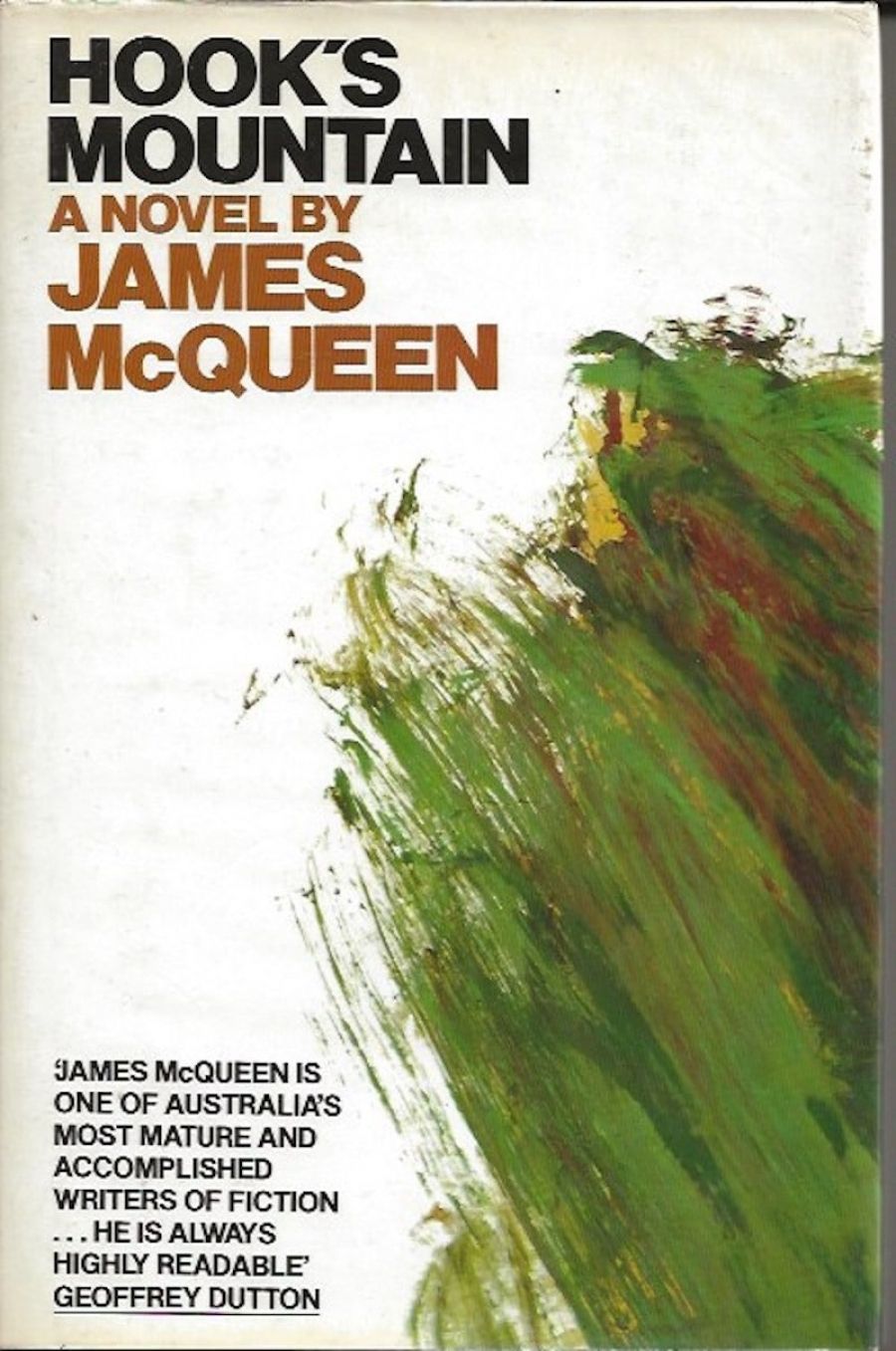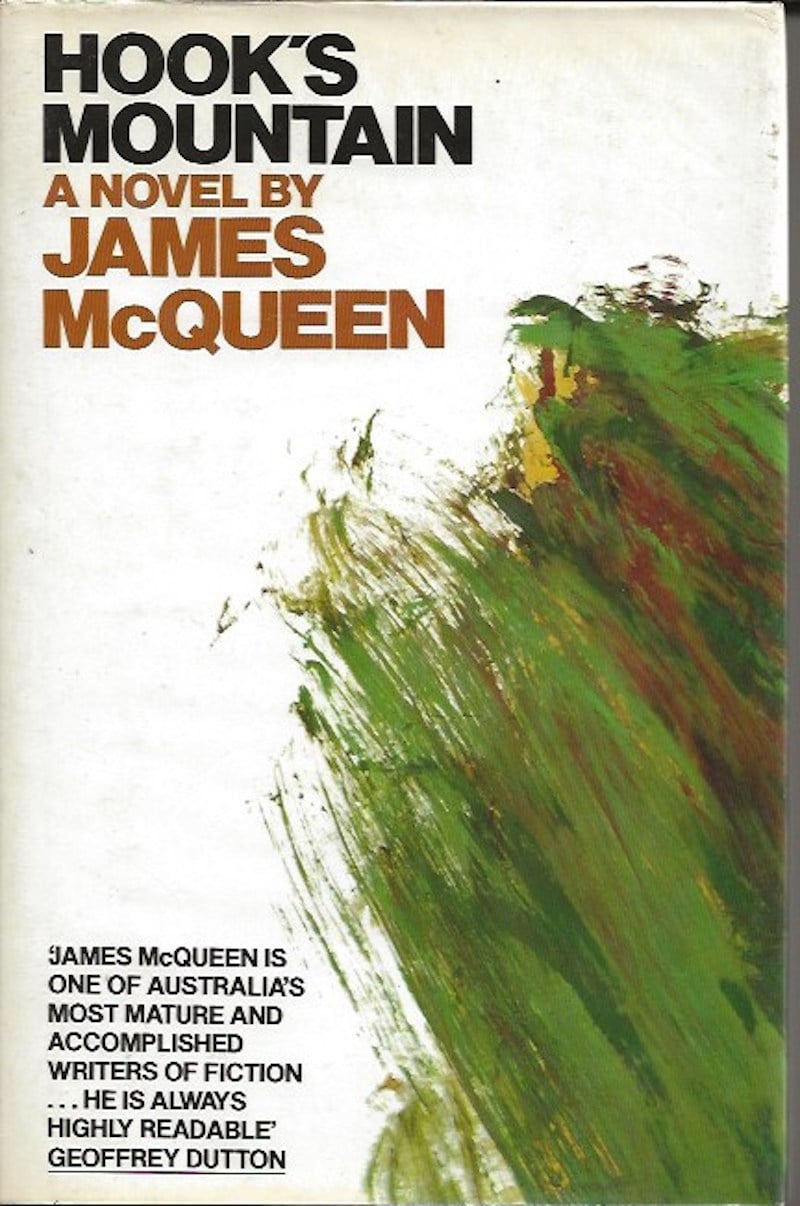
- Free Article: No
- Contents Category: Fiction
- Review Article: Yes
- Article Title: Hook’s Mountain
- Online Only: No
- Custom Highlight Text:
The dustjacket of this novel gives the author grounds for action against his publishers. Bald, bold, equi-width, football scoreboard capitals, half sump oil black and half baby stool brown occupy the left upper corner, announcing author, title and the fact that this is ‘a novel by’. From the lower right corner rises a green, broken ended frond, or wave perhaps, flecked with the same insistent brown, as though the artist, an early morning surfer, had woken with the intermittent sewage-crowded state of Bondi Beach troubling his mind. Granted the visual contradiction manifest here, the quoted words of Geoffrey Dutton, further crowding the surface in the bottom left hand corner, throw their weight behind the bold explicit capitals rather than the vague, Triffid-like thing.
- Book 1 Title: Hook’s Mountain
- Book 1 Biblio: Macmillan 214 p., $14.95 0 0 333 33834 0
- Book 1 Cover Small (400 x 600):

- Book 1 Cover (800 x 1200):

Mr Dutton tells us quite bluntly, in medium size (black) capitals, that the author is ‘one of Australia’s most mature and accomplished writers of fiction ... He is always highly readable.’ The publication in which this vatic pronouncement first appeared, as well as the date of the utterance have been omitted. Maybe it was just something that came to Dutton and demanded tongue, as could happen to any wandering man of letters, while he stood attended by the usual amanuensis, pondering some larger question like Whither Literature. Still, there it is, giving McQueen two further grounds for aggrievement beyond the cluttered, vaguely bilious, uncertain, over-anxious quality of the whole cover. One is the patronizing tone, the assumption underlying the words, that this is one for the low to middle brows. The other, more damaging by far, is that Dutton speaks the truth but fails to realize he is stating, intendedly as a virtue of McQueen’s whole published corpus, what is clearly the chief fault of this present narrative.
Hook’s Mountain is a novel in which any primary, motivating concern with those troublesome, persistent, inescapable social issues which have fired novelists, from Dickenson, to practise their own form of confrontation, is put aside, or recast in luridly distorting terms to satisfy an obsessive need for ‘readability’.
The second male lead of what does sometimes read like the book of the film to be, is named Arthur Blackberry, (that is what I said), a suitably visual semi-grotesque with powerful torso and shoulder development in contrast to the under-grown legs which keep him below the five foot mark. In a remote Australian hill community, he stays alive by foraging in the local rubbish tip for bits and pieces of food and saleable hardware. His creator, James McQueen, has done much the same in getting his narrative act together, delving among the usables of written literature, finding as one example the surname for Lachlan Hook, his ageing, crackshot, steel-spring-reactive, first read in, of all places, J.M. Barrie’s Peter Pan. Hook, who arrives to build himself a small, square house wedged into the hillside above Arthur’s crib also possesses the sort of Kirk Douglas looks which have become, with age, always the more likely to make females gut muscles go all a-quiver. The ‘she’ in what follows is herself now all of twenty-four years while Hook is into his sixties, his AIF commission, his deeds of sheer heroism in wartime Borneo, his Bisley Queen’s Prize, his financier’s career to near millionaire status all behind him.
‘And suddenly, in the soft, shadowy dimness, she clearly saw how he must have looked at twenty-four...oh Christ, she thought, and felt the slow melting in the pit of her belly, oh Christ, he must have been very beautiful ...’
Embitterment towards those who fashioned him superbly as a wartime killer and then refused him a peacetime commission, the ‘Duntroon types’, has warped and bent Hook’s view of life. A piece of shrapnel has done the same to his penis. None of the hippy heroine’s other blokes have had an honourably maimed member, a prick out of plumb in the cause of freedom, and she finds it very on-putting. Erect, of course, it is as straight as the hero’s aim with his other, prize winning weapon. So that only a Hemingway brand sentence (clauses in cumulative relationship) will do for the sexual mayhem when they first hit the cot. Hemingway typically used this profoundly simple and effective device to capture explosive horrors of the outward sort, as when Angelo of A Farewell to Arms has his legs blown off during the Battle of Caporetto. But McQueen’s sentence seems bent upon proving there’s plenty of inward, entirely pleasurable bang-bang too, if you care to listen carefully while you’re getting down to it almost any night of the week.
‘At last he moved and she moved with him, and she was ready, and he was hard entering her and the night began to explode softly and to surge hotly and she scratched and bit and grasped at his lean back and hard buttocks and forced him deeper and deeper and deeper and at last with his mouth on...’
And so for the following five lines which include, to vary the tempo a little, three semi-colons.
Granted this sheer explicitness, running from the capital letters on the dustjacket to moments of whacko in the double bed, it is difficult to see what effect the successive verses from Leonard Cohen’s Last Year’s Man which McQueen uses as chapter headings are meant to have. These are enigmatic, oblique, decadent, insistently allusive, and, at the same marvellous moment, outwardly turned, attuned to those moments of history-become-legend which all listeners can recognize and respond to – Joan of Arc, Bethlehem, Babylon – in contrast to McQueen’s narrative which is profoundly a-historical, the Second World War battles, in which Hook participated, existing only as that which fuelled his sense of outrage against ‘them’, and all their works. Society in Hook’s, equals McQueen’s, way of seeing, is an anonymous, malicious aggregation, dominated by those few, nameless, avaricious males who send the yellow projectiles, bull dozers and cartage trucks, up on to Hook’s Mountain, to tear down native trees for woodchip and to plant the sombre, death symbolizing pines. Two dwellers, urban functionaries are mere stereotypes, cursorily put together and cursorily dismissed in Hook’s monotonously scatological fashion. The drawing-room-comedy mannered shop assistants from whom he buys the four thousand dollar necklace for his sweety pie are ‘turds’. The very highly placed, chauffeur-driven Man from the Ministry who arrives in this remoteness to check on Hook’s psychic condition has, as Hook is happy to tell him, ‘shit running out of (his) ears’. Conservationists are merely so many weak sisters who protest against the deforestation by holding vigils in public parks.
Society and contemporary social currents exist, in the narrative sequence, only to feed inhuman props to further fuel Hook’s sense of aggrievement and keep the whole work ‘readable’. All moves forward, in strictly linear fashion, to those last days and hours when Hook, with Arthur Blackberry sticking close, as befits his surname, takes to his mountain for the final shootout. Sighting down on to the emergent police car, as openers, he ‘takes out’ its blue warning light, (to quote from both the novel and the well-known Bob Dylan lyric). From here on, until the moment when Hook, two clean kills to the good, gets his, after one last scatalogical outburst (‘You piece of shit’), the emphasis is all upon the visuals and sound effects for what I would have thought are very clear reasons. These include the brief appearance to winkle Hook out of hiding with the aid of a loud hailer of one old and still affectionate war time fellow-hero, Sir Roland Culverton, Major General, retired, V.C., M.C., etc., etc. governor of, you will have guessed, the state of Queensland.
Granted the governor’s name is suspiciously like that of the well-known English comedy actor, the one with the droll voice and the slightly raised eyebrows, I’d like to think this is James McQueen giving us the essential little hint that the whole narrative is a bit of a joke, a relaxed play of the romantic imagination, a trying out, in amused and musing spirit of fictional shock effects, a Treasure Island for the middle aged who like to dream, not about buried ingots and moidores, but accessible hippy females and high powered rifles with telescopic sights. As well as having the leisure and the resources, come retirement, to run up a little place in the bush of one’s own, with a large picture window looking down on well wooded ranges, and a wide stone fireplace.
On these matters, on just how to build such a dwelling, on how to tend one’s fruit trees and go after the odd wallaby for the pot, on how to stand in an easy and yet systematized accord with the warmth and the bite of the successive seasons, gladly adjusting one’s routine to each, on these areas of calm, wholesome, rural, economic fact. McQueen is, quite simply, first class.
So what has happened here to one who in his better literary parts, would seem to be a man of peace? Maybe, as I rather suggest, we’re meant to enjoy the joke. Or maybe, contrary wise, McQueen, from watching the deeds of Clint Eastwood and similar self-justifying gun-happy goons, really does believe that a man’s gotter do what a man’s gotter do. Certainly Hook’s Mountain conforms to the stringent conditions laid down for large selling, prize winning novels by male authors in contemporary Australian. One of these is that, regardless of the usual restrictions imposed by space, time and rationality, the narrative should be one in which anything at all goes. And the other is that the whole sequence should nurture male presuppositions about male conduct, since a rampant sexism, of the sort now forbidden by legislation in real life situations, is the way forward for local fiction writers.


Comments powered by CComment